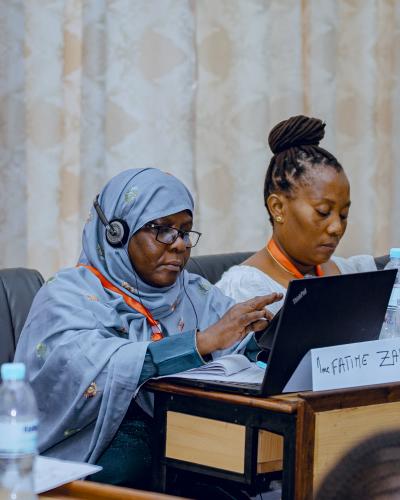
It was with great joy that I participated in the 13th training course of the African School on Internet Governance, AfriSIG 2025, held in Dar es Salaam at the Julius Nyérére International Convention Centre (JNICC), United Republic of Tanzania, from 23 to 28 May 2025.
AfriSIG 2025 was an opportunity for me, as a government official, to understand the need for multistakeholder internet governance. The school provides a framework for the exchange of ideas and experiences between countries to enable them guide their telecommunications development strategies and better understand how to implement digital conventions and laws. This year's curriculum covered critical topics such as data governance, cybersecurity, digital inclusion, AI, and online human rights, with a focus on the WSIS+ 20 review.
I would describe the week at AfriSIG 2025 as convivial and full of activity, day and night, with our tireless Anriette Esterhuysen, APC senior advisor and AfriSIG convener, being a veritable epitome of energy. She was everywhere, sometimes speaking, sometimes leading discussions. She listened attentively to questions and passed the microphone around to the participants. The training session was truly lively and riveting as various speakers led us step by step. It must be said that the speakers, both on-site and online, were all adept at conveying information from across sections and panels. The linguistic diversity was acknowledged with translation provided for the few French speakers.
Working in groups: Stepping into the shoes of civil society
One of the focuses of this year's training was "The Global Digital Compact and the CSTD Working Group on Data Governance at All Levels." We formed four working groups to tackle these topics: civil society, government, parliamentarians, and technical and commercial. This exercise was very interesting. As a member of the government, I joined the civil society group to help me understand what it does and how it defends the voices of minorities. In this group, I asked the rapporteur to play the role of a digital rights defender. We submitted the first document to the jury that comprised experts. Our document was peppered with brackets and we defended it through comments, negotiations and decisions. But nothing is easy; my hope was for our group to be the best.
This was my first time at the AfriSIG training, but I learned a lot and acquired new skills that greatly strengthened my abilities. These will help me carry out my professional work at the Ministry of Telecommunications and Digital Economy in Chad, where all sectoral strategies are decided. I already see myself as an advocate between stakeholders, applying my knowledge. Ultimately, the school is considered one of the continent's most influential platforms capable of shaping the future of the internet in Africa. I wish AfriSIG gives us the opportunity to apply for the training every year because the learning process never ends.
Ms. Fatime Zahia Hamad is a telecommunications works engineer at the Ministry of Telecommunications in Chad; and a MAG IGF AC Digital Economy Focal Point.
The 13th annual African School on Internet Governance (AfriSIG) took place from 23 to 28 May 2025 in Dar es Salaam, United Republic of Tanzania, and was convened by the Association for Progressive Communications (APC), the African Union Commission’s Information Society Division, and Research ICT Africa (RIA), in collaboration with UNECA and the UN IGF Parliamentary Track.
